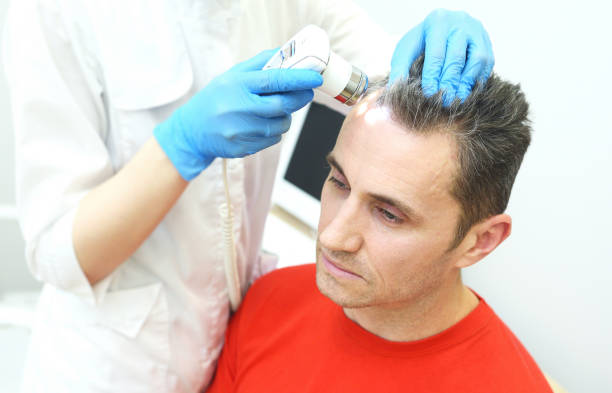Hair Regrowth Clinical Trials: Your Complete 2025 Guide
Hair loss affects millions of Americans, leading many to explore cutting-edge solutions beyond traditional treatments. Hair regrowth clinical trials represent an exciting frontier in hair restoration, offering participants access to innovative therapies while contributing to medical advancement. These research studies test new medications, procedures, and technologies that could revolutionize how we treat hair loss, from androgenetic alopecia to alopecia areata.

What Are Hair Regrowth Clinical Trials?
Hair regrowth clinical trials are carefully controlled research studies that evaluate the safety and effectiveness of new hair restoration treatments. These trials test everything from topical medications and oral supplements to advanced procedures like platelet-rich plasma therapy and laser treatments. Participants receive experimental treatments at no cost while helping researchers gather crucial data about promising hair loss solutions.
Clinical trials follow strict protocols established by the FDA and institutional review boards. Phase I trials focus on safety, Phase II trials examine effectiveness, and Phase III trials compare new treatments to existing standards. Each phase requires specific participant criteria, from age and gender to hair loss patterns and medical history.
How Do Stem Cell Hair Regrowth Clinical Trials Work?
Stem cell hair regrowth clinical trials represent one of the most promising areas in modern hair restoration research. These studies explore how stem cells can regenerate hair follicles and stimulate new hair growth. Researchers extract stem cells from various sources, including adipose tissue, bone marrow, or hair follicles themselves, then process and inject them into areas of hair loss.
Current stem cell trials investigate different delivery methods, cell concentrations, and treatment frequencies. Some studies combine stem cells with growth factors or scaffolding materials to enhance results. Participants typically undergo multiple treatment sessions over several months, with researchers monitoring hair density, thickness, and growth patterns through advanced imaging techniques.
The regenerative potential of stem cells offers hope for individuals with advanced hair loss who haven’t responded to conventional treatments. These trials often include both men and women with various types of hair loss, though specific eligibility requirements vary by study.
What Types of Treatments Are Being Tested?
Beyond stem cell therapy, hair regrowth clinical trials explore numerous innovative approaches. JAK inhibitors, originally developed for autoimmune conditions, show promise for alopecia areata treatment. These oral medications can potentially reverse extensive hair loss by blocking inflammatory pathways that attack hair follicles.
Microneedling devices combined with topical treatments are being studied for their ability to enhance drug absorption and stimulate natural hair growth factors. Low-level laser therapy trials examine optimal wavelengths, treatment durations, and device configurations for maximum effectiveness.
Gene therapy represents another frontier, with researchers developing treatments targeting specific genes associated with hair loss. Hair cloning and follicle regeneration studies aim to create unlimited sources of healthy hair follicles for transplantation. Hormone-blocking agents specifically designed for hair loss prevention are also undergoing rigorous testing.
How to Find Local Clinical Trial Opportunities?
Finding the best paid hair regrowth clinical trials near you requires systematic research across multiple platforms. ClinicalTrials.gov serves as the primary database for federally registered studies, allowing you to search by location, condition, and study status. Major medical centers and dermatology departments often maintain their own trial registries with detailed eligibility requirements.
Contact local universities with medical schools, as they frequently conduct hair loss research. Dermatology practices specializing in hair restoration may also participate in or sponsor clinical trials. Professional organizations like the International Society of Hair Restoration Surgery provide resources for finding reputable research opportunities.
When evaluating opportunities, consider factors like travel requirements, time commitments, and follow-up obligations. Some trials require weekly visits, while others may involve monthly assessments over extended periods. Understanding these requirements helps ensure you can fully participate in chosen studies.
What Are the Benefits and Risks?
Participating in hair regrowth clinical trials offers several advantages beyond potential hair restoration. Participants receive cutting-edge treatments at no cost, often including comprehensive medical evaluations and ongoing monitoring by leading specialists. The close medical supervision provided during trials can detect other health issues early.
However, clinical trials also involve inherent risks and uncertainties. Experimental treatments may cause unexpected side effects or prove ineffective. Participants might receive placebos instead of active treatments, depending on study design. Time commitments can be substantial, potentially requiring multiple appointments and detailed record-keeping.
Some trials restrict the use of other hair loss treatments during participation, which could delay alternative interventions if the experimental treatment fails. Additionally, long-term effects of new treatments remain unknown during early-phase trials.
Understanding Clinical Trial Compensation and Costs
Many hair regrowth clinical trials provide compensation to offset participant time and travel expenses. Payment structures vary significantly depending on study complexity, duration, and location. Participants typically receive payments ranging from $50 to $500 per visit, with additional bonuses for completing entire studies.
| Study Type | Typical Compensation | Additional Benefits | Duration |
|---|---|---|---|
| Topical Treatment Trials | $75-150 per visit | Free medications, monitoring | 6-12 months |
| Stem Cell Studies | $200-500 per visit | Advanced imaging, cell therapy | 12-24 months |
| Device Testing | $100-250 per visit | Equipment use, professional photos | 3-6 months |
| Phase III Trials | $150-300 per visit | Comprehensive care, follow-up | 12-18 months |
Prices, rates, or cost estimates mentioned in this article are based on the latest available information but may change over time. Independent research is advised before making financial decisions.
Beyond direct compensation, participants save significantly on treatments that might otherwise cost thousands of dollars. Stem cell therapies, for example, typically cost $3,000 to $10,000 when performed commercially. Clinical trials provide these advanced treatments free while contributing to medical knowledge.
Participating in hair regrowth clinical trials offers unique opportunities to access innovative treatments while contributing to scientific advancement. These studies provide hope for millions experiencing hair loss, potentially leading to breakthrough therapies that could transform hair restoration medicine. Research thoroughly, understand commitments fully, and consult with healthcare providers before enrolling in any clinical trial.
This article is for informational purposes only and should not be considered medical advice. Please consult a qualified healthcare professional for personalized guidance and treatment.




